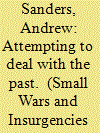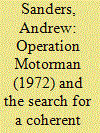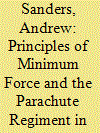| Srl | Item |
| 1 |
ID:
181047


|
|
|
|
|
| Summary/Abstract |
Over the summer of 2019 a number of maroon banners appeared across towns and cities in Northern Ireland, declaring that the local population ‘stands with Soldier F’. Soldier F was a member of the Parachute Regiment who, in March of 2019, was charged with the murders of James Wray and William McKinney and five additional attempted murders as a result of his actions on Bloody Sunday, 30 January 1972. These charges were announced at a time when it was reported that up to 200 former members of the British Army could face official investigation for their conduct in Northern Ireland. These cases sit at the centre of the sensitive and divisive issue of the legacy dimension of the Northern Ireland conflict, posing a challenge to the continuing success of the Northern Ireland peace process. Engaging a developing literature on post conflict reconciliation processes, this article will analyse the issue of legacy prosecutions from Operation Banner.
|
|
|
|
|
|
|
|
|
|
|
|
|
|
|
|
| 2 |
ID:
146042


|
|
|
|
|
| Summary/Abstract |
In 1971, Senator Edward Kennedy co-sponsored a resolution in Congress calling for the withdrawal of British troops from Northern Ireland. The House of Representatives Sub-Committee on Europe held hearings on this resolution in February 1972 in the immediate aftermath of the deaths in Londonderry of “Bloody Sunday.” These hearings represented the first time that several high profile American political figures had spoken out on the developing conflict in Northern Ireland and, whilst the hearings did not lead to a significant change in American policy towards the conflict, the threat of further ones persisted from the Richard Nixon to the Ronald Reagan administrations. This analysis examines the impact of the 1972 Congressional hearings and the threat posed by the possibility of future ones in the wider context of United States policy towards the Northern Ireland conflict until 1981.
|
|
|
|
|
|
|
|
|
|
|
|
|
|
|
|
| 3 |
ID:
122221


|
|
|
|
|
| Publication |
2013.
|
| Summary/Abstract |
The role of the British Army in Northern Ireland during Operation Banner (1969-2007) is an instructive case study of counterinsurgency operations as well as an important chapter in recent British military history. Given troops deployed to the province as aid to the civil power, it is particularly useful in discussions about the principle of minimum force. This article seeks to explore the issue of minimum force through the example of Operation Motorman, the Army's successful attempt to remove the barricades, which had established so-go areas for the security forces in Northern Ireland.
|
|
|
|
|
|
|
|
|
|
|
|
|
|
|
|
| 4 |
ID:
160027


|
|
|
|
|
| Summary/Abstract |
Developing literature on Operation Banner, the codename for the British military operation in Northern Ireland, has indicated that the conduct of soldiers deployed was not always in line with principles of minimum force. Adherence to these principles would seem to have been essential to the success of the operation given the initial deployment of the soldiers was in the role of military aid to the civil power. This article will examine the role of one of the British Army’s most aggressive units, the Parachute Regiment, and will show how the responses of the regiment to the demands of the operation in Northern Ireland were frequently in contravention of minimum force principles.
|
|
|
|
|
|
|
|
|
|
|
|
|
|
|
|